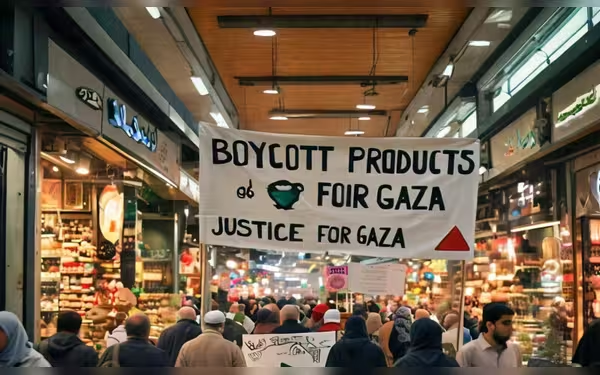Saturday, November 16, 2024 11:47 PM
Impact of Pakistani Boycott on Israeli Products After Gaza War
- Boycott boosts local brands in Pakistan's beverage market.
- Consumer choices reflect solidarity with Palestinians.
- Support for local industries fosters economic growth.
 Image Credits: dawn.com
Image Credits: dawn.comOne year after the Gaza war, Pakistan's boycott of Israeli products boosts local brands and fosters economic growth.
One year has passed since the outbreak of the Gaza war, a conflict that has not only affected the lives of many but has also sparked significant reactions across the globe, including in Pakistan. In response to the ongoing situation, many Pakistanis have chosen to boycott Israeli products, a decision that has led to a noticeable shift in consumer behavior within the country. This boycott is not just a political statement; it reflects a growing sense of solidarity with the Palestinian people and a desire to support local industries.
As the year progressed, the impact of this boycott became increasingly evident, particularly in the carbonated beverages sector. According to Salman Aleem, the Secretary General of the All Pakistan Restaurant Association, local brands have gained substantial market share. "Over the last year in Pakistan, the carbonated beverages industry has seen the most traction on the ground among domestic alternatives for boycotted products. But now the lion’s share is with the local brands, possibly more than 90pc," he stated. This shift indicates a strong preference among consumers for homegrown products, which not only supports the local economy but also fosters a sense of national pride.
The rise of local brands in the beverage market is a testament to the resilience and adaptability of Pakistani entrepreneurs. Many companies have seized the opportunity to fill the gap left by the absence of Israeli products, offering consumers a variety of choices that cater to different tastes and preferences. This has not only benefited the businesses involved but has also encouraged innovation and competition within the industry.
Moreover, the boycott has sparked discussions about the importance of self-reliance and the need to support local industries. As consumers become more aware of the impact of their purchasing decisions, there is a growing trend towards prioritizing products made in Pakistan. This shift is not just about avoiding Israeli goods; it is about embracing and uplifting local talent and resources.
The past year has shown that consumer choices can have a profound impact on the market landscape. The boycott of Israeli products has not only led to a surge in local brands but has also fostered a sense of unity among Pakistanis. As the country continues to navigate its stance on international issues, the support for local industries remains a powerful tool for economic growth and national pride. It is a reminder that every purchase is a vote for the kind of world we want to live in, and in this case, many Pakistanis are choosing to invest in their own future.













